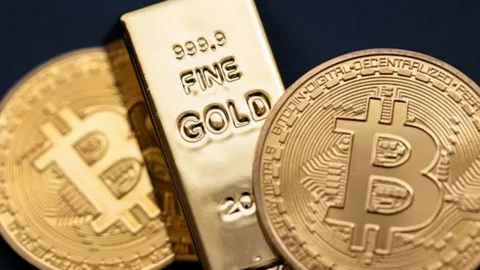Bitcoin scares gold ETF stakeholders with its market performance, drawing attention away from traditional gold investments. Discover how Bitcoin is upending gold-backed funds. In recent months, Bitcoin (BTC) has generated a stir in the financial world, worrying traditional investors. The owners of the largest gold ETF, which is now vying with Bitcoin as a store of value, are watching. Bitcoin’s popularity and volatility have upended gold’s safe-haven status. As the largest gold ETF owner grows concerned that Bitcoin’s performance may compromise its market position, investment strategy has been reassessed.
Investor Sentiment Bitcoin vs Gold
Gold has been a safe-haven investment for millennia, especially during the economic crisis. People have used it to hedge inflation, protect money, and prevent market instability. Bitcoin, the largest cryptocurrency, may compete with gold. Bitcoin, a digital gold substitute, was once a fad or speculation. Due to its 21 million BTC supply, decentralization, and institutional adoption, Bitcoin is considered a store of value like gold. This shift in perception has led many investors to reconsider their portfolios, with some favoring Bitcoin over gold.
Bitcoin’s Rise Threatens Gold ETFs
Many investors buy gold ETFs like SPDR Gold Shares (GLD) instead of bullion. ETFs have raised billions, and institutional investors utilize them to diversify securely. However, Bitcoin’s meteoric rise has raised competition for these traditional investments. Bitcoin reached historic highs in 2020, attracting institutional interest. Tesla, MicroStrategy, and Square openly invested in Bitcoin, changing investor behavior. Institutional use of Bitcoin has pushed it past the market caps of gold mining businesses and other significant corporations. Bitcoin’s rising value has drawn funds from gold ETFs.
Why Bitcoin’s Run Concerns
Bitcoin’s ascent changes investor preferences for the top gold ETF owners. Many investors are seeking alternatives to traditional assets, and Bitcoin appeals. New investors like Bitcoin’s decentralization, strong returns, and rising acceptability as a store of money. Bitcoin’s 21 million coin supply is enticing during economic uncertainty because of its scarcity. Bitcoin’s deflationary model makes it a better inflation hedge than gold, which has traditionally been the best.
Huge Bitcoin price rises have drawn new investors seeking high-risk, high-reward prospects. Investors seeking speedier gains have lost interest in gold’s more stable pricing. Bitcoin’s remarkable rise from $10,000 to over $60,000 in a few years has attracted both individual and institutional investors. This shift in opinion worries the gold ETF sector, which now competes with an asset that may give larger returns in a shorter timeframe. Bitcoin’s volatility, although scary to some, attracts risk-tolerant investors hoping to profit.
Gold ETFs Adapting
Gold ETFs must preserve their safe-haven investing dominance while Bitcoin’s market cap grows. As younger investors include cryptocurrencies in their portfolios, many analysts believe Bitcoin might someday equal gold as the store of value. Gold is still important to many investing plans, but Bitcoin has caused ETF owners to reassess their approach. Some are diversifying with Bitcoin, while others are examining cryptocurrency exposure.
The U.S. launch of Bitcoin ETFs has given investors a regulated and familiar means to invest in Bitcoin while keeping the ETF structure. In this changing scenario, several gold ETF owners worry Bitcoin could eat into their market share. Bitcoin is a major competitor to gold due to its high returns, institutional adoption, and technological developments. Gold ETFs must incorporate cryptocurrency or risk losing investors seeking digital alternatives.
Gold, Bitcoin, Institutional Adoption
Institutional adoption has helped Bitcoin become a store of wealth. Tesla, MicroStrategy, and Galaxy Digital have invested heavily in Bitcoin, changing its image. Bitcoin is now considered a respectable financial tool that can compete with gold by institutional investors. Bitcoin’s acceptance by large financial institutions has pressured gold ETF innovation.
Bitcoin ETFs show how the financial system is adapting to investing changes. Traditional investors can easily invest in Bitcoin through these ETFs, which are regulated and accessible. Despite Bitcoin’s growth, gold remains a valuable store of wealth and safe haven against economic crises. Bitcoin’s growing significance in the financial ecosystem has caused the gold ETF sector to rethink its place in a digital, asset-light world.
Will Bitcoin Threaten Gold?
Bitcoin scares gold ETF owners with its potential to disrupt traditional investment markets. While its future is unknown, Bitcoin has shown it can compete with gold for investor capital. Bitcoin is challenging the gold ETF sector and may eventually replace gold as a store of wealth. The rapid growth of cryptocurrency technology and institutional interest in Bitcoin indicate that its significance in the global financial system will grow.
Bitcoin could change how investors see asset preservation and long-term growth if it gains adoption and is integrated into established financial systems. The largest gold ETF owners must adjust for now. Gold will likely always have a place in investing, but Bitcoin has created a new paradigm that investors must consider. Bitcoin’s ascent shows that traditional finance must adapt to the digital revolution.
Also Read: Bitcoin Prodigy? Kiyosaki Backs Saylor’s Risky Move
In Summary
Bitcoin scares gold ETF owners with its high returns, decentralization, and potential as an alternative wealth depository. The rise of Bitcoin challenges gold’s safe-haven status. This turbulence has forced gold ETF owners to reassess their plans and adjust to market changes. Bitcoin’s institutional adoption, expanding market capitalization, and technological advances make it a genuine competitor to gold as the most trustworthy store of value. Bitcoin will disrupt the gold market as more investors accept it, and digital assets will transform finance for years.









